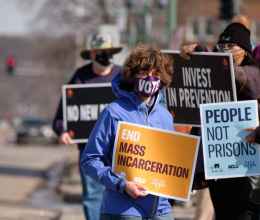Augusta – The Maine Coalition for Sensible Drug Policy today voiced support for LD 1492, An Act to Reform Drug Sentencing Laws, which it said will save lives by bringing a public health approach to Maine’s drug policy. The Committee on Criminal Justice and Public Safety will hold a public hearing on the bill, sponsored by Rep. Pinny Beebe-Center (D-Rockland), today, Monday, May 13, at 9:00 a.m.
Despite recent improvements, Mainers still face extremely harsh penalties for even minor drug offenses. Possession of just two grams of heroin – about half of what a single, heavy drug user might use in one week – is defined as trafficking. LD 1492 would eliminate the presumption of trafficking based solely on the amount or weight of drugs in possession, remove criminal penalties for drug possession for personal use, and decriminalize possession of drug paraphernalia or other harm-reduction tools such as hypodermic needles.
A 2016 poll of likely Maine voters showed that a substantial majority support decriminalizing drug possession. 64 percent believe people caught with a small amount of drugs for personal use should be evaluated for drug issues and offered treatment but not arrested or face jail time. 71 percent say substantially reducing incarceration for drug use is important to them.
Several prominent organizations around the world support ending the criminalization of drug possession, including the American Public Health Association, the World Health Organization, the Global Commission on Drug Policy, the Organization of American States and the International Red Cross.
Existing models of drug law reform show that localities can eliminate penalties for drug possession while also decreasing problematic drug use and its consequences. Portugal, for which the most complete data is available, decriminalized drug possession in 2001. Since then, overdose deaths, HIV infection among drug users, and rates of problematic drug use have plummeted.
In January, the coalition released a report titled “Recommendations for Sensible Drug Policy,” a set of comprehensive recommendations to meaningfully address the opioid crisis and the negative consequences of Maine's drug policy. That report can be found here: https://www.mainehealthequity.org/maine-coalition-for-sensible-drug-p
The following quotes can be attributed as noted:
Kenney Miller, executive director, Health Equity Alliance:
"It's time for lawmakers to treat the problem of drug use as a social problem and a public health issue requiring complex solutions. It requires us to treat people who use drugs with compassion - to love them into recovery. The criminalization of possession pushes drug use out of the light of day, into the shadows. Criminalization perpetuates stigma against people who use drugs. Criminalization makes drug use more dangerous and harder to address, it keeps people out of treatment. And criminalization is a profound barrier to recovery, making life more difficult for people and triggering relapse.”
Laurent F. Gilbert, former Mayor and Chief of Police, Lewiston:
"The ‘War On Drugs’ has been a dismal failure. The drug problem is a major health issue and the cure for it is to treat it like an illness by providing health rehabilitation and the funding for it. By reducing the high cost of incarceration, we could begin to afford the treatment professionals and facilities for such treatment. Currently, there are such long waiting lists for treatment that it is counterproductive. We cannot keep doing the same thing and expect a different result."
Meagan Sway, Policy Counsel, ACLU of Maine:
“Jails weren’t built to fix substance use disorder and it doesn’t make sense to keep waiting for that to happen. Trying to fight Maine’s opioid crisis with harsh criminal justice penalties is a failed policy that undermines recovery and actually makes it more likely people will return to drug use.”
Chantel St. Laurent, Mainer in recovery, Lewiston:
"I started selling drugs to support my habit. Eventually I was arrested. Thankfully, I had a lot of people in my corner and good legal support. Most people with substance use disorder aren’t as fortunate and end up in prison with a felony mark against them. That mark follows them and makes it that much harder to get a job, get their life stabilized so they can get the help they need. While I was ultimately able to get the support I needed to be on the path to recovery, there are many others who didn’t and I’m here to speak up for them."










